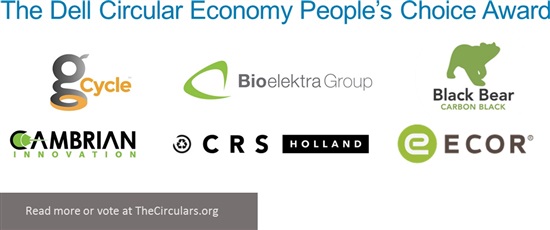Let’s face it: we’re all ready for this election season to be over.
Amidst all the negativity and divisive choices, I would like to offer you an opportunity to feel good and cast your vote for one of the six great entrepreneurial companies competing for the Dell Circular Economy People’s Choice Award as part of The Circulars.
The what now? Oh, you’d like a voting guide. Well, first, let me explain what the circular economy is.
A quick message about circular economies
Circular economies, so the theory says, produce virtually no waste as materials get re-used and recycled continuously. It’s a dramatic shift from the current linear economy in which we take, make, consume and dispose – drawing regularly on natural resources to create products that eventually wind up as trash. And now for the scary statistic: we’re using 60 percent more resources than the earth can regenerate each year. Put another way, we used up our annual allotment of “stuff” by August 8 this year.
The idea with the circular economy is that nothing should exit the economy. What used to be considered waste now becomes a resource. To accomplish that, you need to design products with their entire lifecycle in mind, thinking up front about how to make reuse, repair, disassembly and recycling easier. You also have to treat all materials as valuable and integral to the economy. And lastly you need to look at the resources you use: using recycled or reclaimed materials, choosing renewable materials, or eliminating the need to use any materials at all.
At Dell, we’re big proponents of transitioning to the circular economy, in which we prioritize the recirculation of materials and the reduction of overall resource use. We are transforming the way we design our products and services, looking for those efficiencies. And we see technology as an important tool for anyone looking to do the same. The up-side to shifting to a circular economy is tremendous: estimates show the potential for creating $1 trillion in value annually by 2025.
Where is my voter’s guide?
We are getting there. The Circulars are an initiative of the World Economic Forum and Forum of Young Global Leaders in collaboration with Accenture. The Awards engage individuals and organizations from across business and civil society across seven award categories, ranging from multinationals to entrepreneurs, with winners receiving the opportunity to attend the ceremony in Davos. Dell was honored to be an inaugural winner in 2015 and this year we are paying it forward with the Dell Circular Economy People’s Choice Award.
The award is for early-stage innovators and entrepreneurs at the forefront of the circular economy, demonstrating creativity and market disruption.
You get to tell us which is the most inspiring—the winner and runners up for this award are chosen via public vote through November 11. The People’s Choice Winner will be presented a trophy at The Circulars 2017 ceremony during the World Economic Forum Annual Meeting in Davos, January 2017.
Your six nominees are:
gCycle: Made by gDiapers, this is a new service that includes a 100-percent compostable diaper – allowing childcare centers to divert up to 80 percent of their waste from landfills. It replaces oil-based plastic diapers – the third-biggest single product waste contributor to landfills globally – with a non-GMO corn biofilm that is compostable.
Cambrian Innovation: This biotech company’s EcoVolt solutions extract clean energy and clean water via on-site wastewater treatment. At one facility in California, they have cut water consumption by 40 percent while generating 120 kilowatts of renewable energy. They also offer a service-based financing model where Cambrian retains ownership, installs and operates the EcoVolt solutions on premises, eliminating upfront costs and capital constraints for their customers.
Black Bear Carbon: With 1 billion tires reaching end of life each year, Black Bear’s innovative technology that extracts carbon black from these waste tires is an example of turning others’ waste into a resource. Carbon black – normally produced from crude oil – is used in tires as well as for pigments in coatings, plastics and inks. Each ton of carbon black produced by Black Bear saves 2.5 tons of oil and 5 tons of carbon dioxide.
CRS Holland: Transcontinental cables have been around since 1850 and today 94 percent of unused cables are lying on the seabed. With an estimated 1.7 million km of cables, nearly 800,000 metric tons of metals and a similar amount of plastics, there is literally billions of dollars sitting beneath the waves. CRS Holland works with the telecom companies to recover and recycle or redeploy the cables and undersea equipment.
Bioelektra Group: A long-time challenge of the recycling industry has been contamination – like when you throw a banana peel in the paper recycling. Bioelektra Group’s RotoSTERIL technology enables the treatment of unsegregated municipal waste and recovers over 90 percent of it. By using pressure and heat they eliminate microorganisms and remove the biodegradable portion, making it easier to process the recyclables.
ECOR: There is a lot of fiber waste in the world – from paper, cardboard, agriculture, forest products, textiles, even coffee and beer. ECOR is upcycling these fibers into advanced building materials using only water, pressure and heat to create a non-toxic, VOC-free building material that can replace wood, plywood, particleboard, and plastics. Plus, it is easily printed or painted, can be treated for water resistance and can even be curved. They recover and reuse 99 percent of the water and their factories are designed to have zero impact.
Voting continues through Friday, November 11. Visit the voting page and cast your ballot today.
